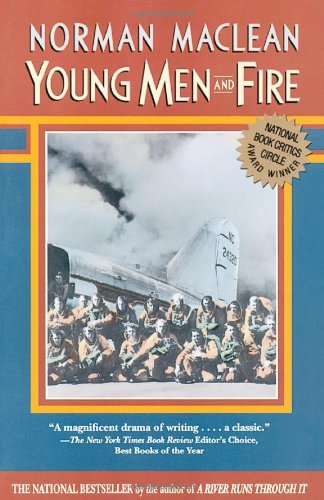When Norman MacLean set out to write (in Young Men and Fire) the story of the 1949 Mann Gulch Fire, he was haunted by one thing about it: fifteen elite Smokejumpers had dropped to fight the fire, and scarcely an hour later, ten of them were dead.
Three men who survived to return from the mountain would bear the scars for the rest of their lives. For two more, life was over even as they described their escape to rescuers; they were mortally burned, and both were dead within a day.
MacLean could approach this tale from his own experience as a fire-fighter in Montana. He recounts his fear in trying, with cheaply hobnailed boots that slipped on the grassy slopes, to outrace a fire and reach safety at the ridgeline.
As a fire up a hillside closes in, everything becomes a mode of exhaustion—fear, thirst, terror, a twitch in the flesh that still has a preference to live, all become exhaustion. So on closer examination, burning to death on a mountainside is dying at least three times, not two times as has been said before—first, considerably ahead of the fire, you reach the verge of death in your boots and your legs; next, as you fail, you sink back in the region of strange gases and red and blue darts where there is no oxygen and here you die in your lungs; then you sink in prayer into the main fire that consumes you, and if you are a Catholic about all that remains of you is your cross.
Catholic prayers and themes run throughout MacLean's tale. He likens the ordeal of the Smokejumpers time and again to stations of the cross, evoking the agony of Christ in their pain. Some of the Smokejumpers were Catholic; one body was identified by the remains of the medallion he customarily wore, that and a snake-bite kit loaned to him before the drop by the fire-fighter who found his body.
The power of MacLean's prose is such that it takes the reader back in time and places him on that hillside with those struggling men. Having experienced that terror for himself, he gives us just enough to feel their panic, to share their desperate attempts to save themselves, to recognize the moment when the battle is no longer with the fire, but with themselves and their own weaknesses.
...none of them had been on a blowup before and they were getting exhausted and confused. The world roared at them—there was no safe place inside and there was almost no outside. By now they were short of breath from the exertion of their climbing and their lungs were being scarred by the heat. A world was coming where no organ of the body had consciousness but the lungs.
Any time we are nearly overwhelmed in our sympathy with these men, MacLean draws back to examine less brutally-engaging facts. The book includes meticulous descriptions of how and why blowups happen in mountain fires, details the ways in which fire-fight methods have changed to avoid another Mann Gulch disaster*, and includes stories from MacLean's family and friends that shed light on the lives—and deaths—of these Smokejumpers.
Although he worked on it each year following the fire. Norman MacLean did not live to finish his account of the tragedy. He was determined to tell the story of these men in a way that would commemorate their lives. "They were young," he says, "and did not leave much behind them and need someone to remember them." (The book was completed posthumously by the Chicago Press, and won the 1992 General Nonfiction award from the American Book Critics Circle.)
This is not an easy read. It is, nevertheless, one of those books that I am drawn to reread periodically, in part for a painful tale brilliantly told, and in equal part to connect with Norman MacLean's expertise in that telling. I recommend it highly.
_____________________________
*But not sufficiently remembered to avoid another such disaster: MacLean's son John N. MacLean would write Fire on the Mountain to chronicle another immense wildfire, this time on Colorado's Storm King Mountain in 1994, that would take the lives of fourteen firefighters—among them Smokejumpers and helicopter crew—due to the inadequately-applied lessons from the Mann Gulch disaster.
Young Men and Fire is available on Kindle. Fire On the Mountain, sadly, is not.

No comments:
Post a Comment